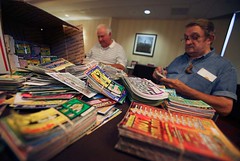
PREV ARTICLE
NEXT ARTICLE
FULL ISSUE
PREV FULL ISSUE
COLLECTING LOTTERY TICKETS
Are lottery tickets numismatic items? Well, I do think they are related, and they are indeed a collectible. Here's an Associated Press article about a recent convention of the Global Lottery Collector's Society. It includes a word I'd never herd before - "lotologist". I guess I've been a lotologist for years and didn't know it. I don't collect the modern tickets, but I have a small collection of early lottery tickets from the Washington, D.C. area. I also have a mini-shelf of books on the history of lotteries in England and the U.S.
Early lottery tickets share a lot in common with colonial paper money - they were often printed by the same printers on similar paper with similar images and markings. Many were authorized by local and state governments, and signed by government officials and various dignitaries of the day. -Editor
From a $3 Montana lottery ticket based on the game Uno to a series of $2 "Star Trek" stubs from Virginia, the game themes run the gamut from movies and TV shows to sports teams and holiday cheer. The cards come in different sizes, shapes and denominations. "The whole purpose of collecting is not to get rich, or to get lucky, but to get the tickets," said club co-founder Bill Pasquino. "But if I happen to hit a jackpot along the way, I'd be very happy." Last weekend, Pasquino joined about two dozen other club members at the group's annual "Lotovention." Held this year in northeast Philadelphia, the gathering is an opportunity to meet other self-described "lotologists," trade tickets and take a gander at the never-ending multitude of collectible material. Pasquino, 64, a retired teacher from Lancaster, Pa., said that when the club started in the late 1980s, only about a dozen states had lotteries — and none would issue more than six tickets per year. Today, 43 states plus Washington, D.C., Puerto Rico and the U.S. Virgin Islands have lotteries, as do countries across the world. Pennsylvania alone issues between 55 and 65 new instant games a year, according to state lottery spokeswoman Elizabeth Brassell. Recent scratch-offs include the $10 "Stacks of Cash" ticket — top prize $200,000 — and the cheaper $1 "Dice Doubler," with a jackpot of merely $2,000. While the club focuses on modern scratch-off tickets, lotteries in the U.S. date to Colonial times. Princeton University's library boasts a collection of tickets from 1761-1826, noting that lotteries were common sources of public financing because there were relatively few banks. Benjamin Franklin financed cannons for the Revolutionary War through lotteries, while Thomas Jefferson disposed of most of his estate through such tickets, according to Princeton archives.
These are among the collectibles of the future. I harp on this topic over and over, but NOW is always a great time to collect things. I'm very fortunate as a collector today to have examples of early lottery tickets to enjoy. But they wouldn't exist if someone hadn't set them aside two centuries ago. What are you setting aside for collectors of the future?
-Editor
To read the complete article, see:
Lottery Ticket Collectors Eye Keepsakes, Not Money
(www.artdaily.org/index.asp?int_sec=2&int_new=49769)
The Numismatic Bibliomania Society is a non-profit organization promoting numismatic literature. See our web site at coinbooks.org. To submit items for publication in The E-Sylum, write to the Editor at this address: whomren@gmail.com To subscribe go to: https://my.binhost.com/lists/listinfo/esylum All Rights Reserved. NBS Home Page Contact the NBS webmaster 
|
